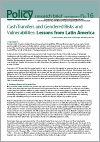
Understanding the Socio-Environmental Policy Space
Abstract:The social pillar—and thus social equity and social development—is critical to understanding what green growth (or making the economic patterns of development more sustainable) needs to do (that has not been done before), who it needs to serve (who has been left out) and why we have failed to do this before (structural realities). The emerging focus on the socio-environmental policy space in the context of Rio +20 is timely considering the staggering evidence available about the interconnectedness of environmental vulnerabilities and resource inequality in hampering and undermining social development. Resource inequity abounds in numerous areas: sanitation, access to water, and energy, to name a few. Leading voices, particularly President Dilma Rousseff of Brazil, lend necessary visibility and validity to the importance of debate and discussion on this theme. While Rio 1992 signalled significant advances within global policy frameworks, the promise has been largely unfulfilled. (…)